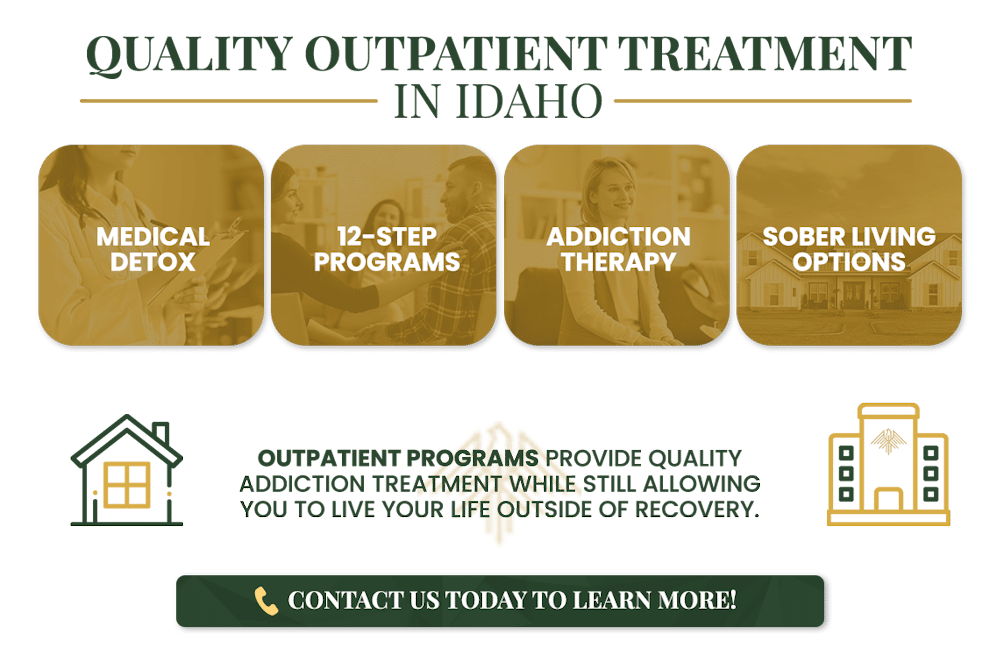Outpatient Treatment Program in Idaho
Recovering from drug and alcohol addiction can be a challenging time in anyone’s life. The journey to overcome substance abuse issues can be emotionally and physically taxing. Receiving care that speaks to the difficulties that patients are facing is one of the crucial components of building successful addiction treatment programs. This is why we offer such treatment and care here at our facility. At Eagle Creek Ranch Recovery in Nampa, Idaho, we have seen successful recovery outcomes with the levels of care and resources that we provide, especially our outpatient rehab program (OP).
An outpatient rehab program offers drug and alcohol treatment and support groups that can be attended at different times throughout the week. With this routine, patients can carry on with their daily tasks and remain in their homes, but they must check into treatment at the designated times for counseling and medication.
The primary focus of outpatient treatment programs is on counseling, education, and creating a network of support. They come in various types such as intensive outpatient programs (IOP) and partial hospitalization programs (PHP). Depending on the level of care needed, these programs can vary in intensity, and offer a range of services including:
- Medical detox
- Substance abuse education
- Cravings and triggers management
- Mental health treatment
- Addiction therapy
- 12-step programs
- Transitional living facility referrals (including sober living homes)
- Relapse prevention training
An outpatient rehab facility can be very beneficial for individuals with mild substance abuse problems who are serious about getting sober. They allow the freedom to continue working and caring for family while in recovery.
An outpatient addiction rehab program may be advantageous for those who have a strong desire to succeed in recovery and who adopt a dedicated, disciplined approach.
Contact Eagle Creek Ranch
Recovery Today!
Why Wait? Find The Help You Need By Reaching Out To Us Today! Our Admissions Team Is Standing By.
The Structure of Outpatient Programs

Some individuals seeking treatment for drug or alcohol addiction may require medical care due to their chemical dependency and the potential risk of withdrawal symptoms. Medical specialists must be on hand to provide any necessary treatment because these symptoms, particularly in the case of alcohol detox, can occasionally be so severe as to qualify as medical emergencies.
Our outpatient program (OP), which is intended for those who have recently finished medical detox and/or inpatient treatment, is the following critical stage in addiction recovery. For those in recovery, the time after treatment is frequently fragile because of the mental, emotional, physical, and spiritual changes that come with abstinence.
Our skilled team understands how difficult the journey can be and is here to provide structure and support to our clients every step of the way.
Types of Outpatient Programs
Depending on the substance used, the extent of the addiction, and the stage of recovery, there are various types of outpatient rehab. The following three categories best describe the common forms of outpatient rehab:
To track success, intensive outpatient programs create a treatment plan with specific, quantifiable milestones. The weekly time commitment required lowers when these milestones are reached.
For those who are serious about quitting drugs and alcohol but still need to be able to work and handle everyday duties, outpatient treatment is an excellent alternative. An IOP entails counseling sessions, relapse prevention education, and attendance in a 12-step or comparable recovery support group for a few hours each week.
The highest level of care offered in outpatient settings is a partial hospitalization program. Clients who enroll in a PHP agree to attend meetings for several hours each day, five to seven days a week, at an outpatient facility. Patients will engage in continuing treatment, group counseling, biofeedback, and other supplemental therapies like art or music therapy during this period.
After each session, patients may go back home, either to their families or a sober living facility. A partial hospitalization program calls for a significant time commitment, which may restrict a person’s capacity to work or attend school until the program is over.
Benefits of Outpatient Care for Addiction Treatment

- Affordability: Outpatient care is more economical than inpatient because you can remain at home during it and won’t have to pay for housing at a facility.
- Flexibility: Usually, outpatient care can accommodate your schedule. For people who believe they cannot leave their jobs or families for a long time, this is advantageous.
- Support and Family: Family support and involvement are stressed throughout the outpatient rehab program because they can help you stay motivated to pursue sobriety.
At Eagle Creek Ranch Recovery, our treatment center provides outpatient addiction treatment that allows people to receive the physical and mental health care they need in a supportive environment.
Outpatient Treatment vs. Inpatient Treatment
The primary distinction between an outpatient rehab program and an inpatient treatment program is that outpatient settings don’t require around-the-clock on-site care and monitoring in a facility. Instead, they are free to come and go whenever they choose and attend to duties like child care, work, and school.
They might ask to postpone their appointment to a time that better suits their needs if they are not available to visit the hospital at the scheduled time. If a patient feels they need more help, they are invited to schedule particular hours with their therapist or support group.
However, patients with a long-standing addiction who are at a high risk of relapsing may benefit better in inpatient care settings where they receive 24/7 drug and alcohol treatment. Inpatient programs can be more effective in such instances. In these cases, individuals can attend our residential treatment program.
Is Outpatient or Inpatient Care Right for You?
We are here to support you in the decision-making process and make sure our treatment programs offer the correct degree of care for you or a loved one.
Some people in recovery may benefit from Outpatient drug rehab because of its adaptability. Less rigid than programs like an intensive outpatient program (IOP) and a partial hospitalization program (PHP). Depending on each patient’s health and unique requirements, our medical professionals will decide the best course of action.
Are you unclear whether outpatient rehab is the best option for your mental health and addiction treatment needs? Depending on each patient’s health and unique requirements, our medical professionals will determine the best course of action and level of care for your specific needs.
Why Choose Eagle Creek Recovery?
At Eagle Creek Recovery, we truly provide clients with a warm, caring, and structured environment where they will identify the origins of their drug abuse problem, resolve their mental health difficulties, and look forward to a better future. For people in recovery, our outpatient rehab program offers the perfect amount of independence and structure. Individuals are allowed to work and attend school as long as they are committed to their program, completely involved in it, and follow our rules.
Finding treatment centers in your area can be challenging. But, our drug abuse treatment programs are here to help those who are going through the recovery process. Our outpatient program is a wonderful fit for men who must continue to manage employment or family responsibilities while pursuing their recovery. Your long-term sobriety and ability to avoid relapse are our priorities. We are here to help you break free from substance addiction and find the healing and hope you need.
Selecting a course of treatment for addiction might be challenging. When it comes to the recovery process, it’s important to investigate all accessible choices. Thankfully, our team is here to make effective treatment easily accessible to individuals who are working to overcome substance abuse. For more information on the outpatient treatment options and other levels of care we offer, contact our admissions team today.

Clinical Director
Kendall Maloof is the clinical director at Eagle Creek Ranch Recovery. She is a licensed marriage and family therapist and has held multiple leadership roles before settling here at Eagle Creek. Kendall received her master’s degree in marriage and family therapy from the Chicago School of Professional Psychology in 2016. Her career in mental and behavioral health began in 2014 when she took up internships in both the nonprofit and for profit sectors. She interned at multiple reputable companies, such as The Living Success Center and 449 Recovery in California.
In 2019, Kendall became the clinical director of Sunsets Recovery for Woman, a dual diagnosis program in southern California. Kendall is a natural leader. She has an incredible ability to problem solve and stay calm in any situation. Kendall never fails to show up when she is needed, and her calm demeanor makes her team and clients feel at ease. Eagle Creek Ranch Recovery is proud to have Kendall as our clinical director.




